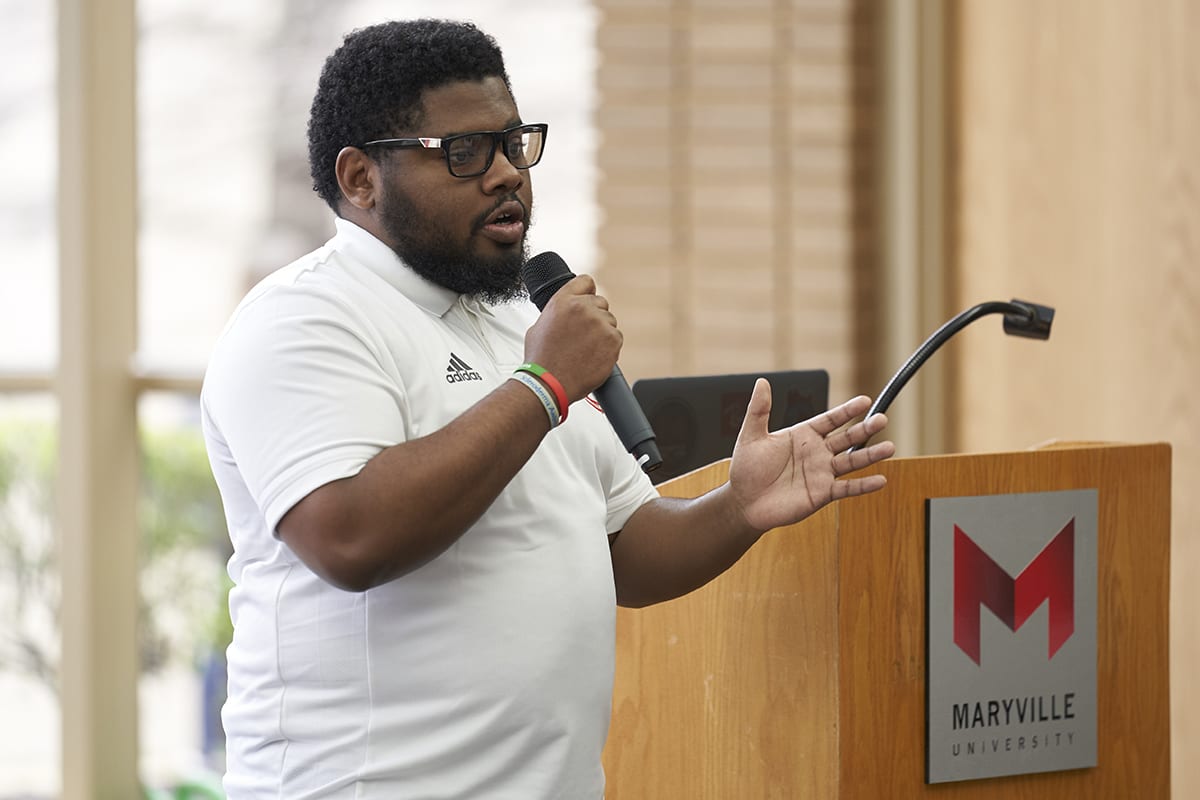Let’s face it — some things are hard to talk about. Topics like race, gender, ethnicity, sexuality and cultural differences can be real conversation stoppers. That’s where Maryville’s Multicultural Scholars Peer Educators Series comes in.
Peer educators are seniors in the Multicultural Scholars Program, which provides scholarships to students from diverse backgrounds. Each peer educator is specially trained to engage and participate in difficult conversations. They illustrate their training by developing workshops around social justice, diversity and inclusion and deliver them to the Maryville community.
The workshop “Cultural Appropriation & Cultural Appreciation” was presented by peer educators Ulices Zuniga and Austin Davis. The pair used a multimedia approach including PowerPoint, YouTube and audience interaction to break down barriers and encourage conversation. “Our goal was for people to walk away from the presentation being more comfortable with the topic,” said Davis, a communication student.
Davis and Zuniga began by defining cultural appropriation as the act of taking or using things from a culture that is not your own, especially without showing you understand or respect that culture.
“Think about Cinco de Mayo,” Zuniga said, a criminal justice student from Mexico. “In the U.S., it’s a day to get drunk. But in Mexico, it celebrates the Battle of Puebla in 1862, in which Mexicans defeated the French. They were not supposed to win. Cinco de Mayo honors the people who died in battle and the soldiers who went back home.”
Examples of cultural appropriation abound in American culture, and Davis and Zuniga discussed many of them, including the controversy surrounding a children’s costume based off the Disney film “Moana.” The costume represented the demigod Maui, the fictional character played by Dwayne “The Rock” Johnson, and was a brown skin bodysuit adorned with Polynesian tattoos and a faux-leaf skirt. Disney pulled the costume off shelves after the item sparked outrage.
Davis and Zuniga asked audience members to team up and discuss the “Moana” controversy. One person was to argue that the costume appropriates the culture of the Maui people by mimicking their body tattoos, while the other person argued against the idea of cultural appropriation. It quickly became clear why conversations like these are so difficult.
“The most important thing we hope people realized was that there was a lot of gray area,” Davis said. “They may have started the conversation being very passionate about their point of view, but the more they heard others’ viewpoints, the more we hope they saw it’s not as simple as they originally thought.”
Zuniga agreed. “Maryville University has people from different parts of Missouri, different countries and even different parts of the world,” he said. “It was interesting to see how everyone brought something new to the conversation and offered many different perspectives.”
Like all peer educators, Davis and Zuniga were well prepared to facilitate their workshop. Becoming a peer educator is the final step in the four-year Multicultural Scholars Program. When students enter as freshmen, they spend a year mastering self-awareness including their individual talents and strengths. In the next year, they develop social awareness of their peers and examine their own beliefs in relation to their peers. As juniors, they learn how to talk about differences before finally developing their presentations and preparing to be peer educators as seniors.
“It’s not about changing minds, it’s about starting conversations,” said Ashley Storman, program coordinator for the Office of Diversity and Inclusion. That’s a big step for an initiative that started less than 10 years ago to recruit and retain diverse students. The Multicultural Scholars Program now seeks to build a more welcoming and inclusive campus environment for people with different physical abilities, gender identifications, sexual preferences, religions and more.
“We’ll take our message into any space on campus, whether it’s athletics, the library or for another student organization,” Storman said. “We want people to know that promoting diversity and inclusion is not just our job — it’s everyone’s job.”
